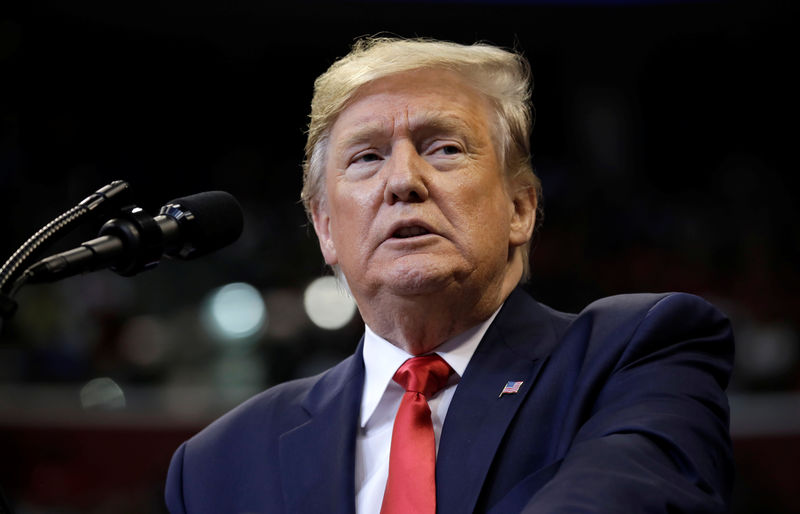By David Morgan
WASHINGTON (Reuters) - Congressional Democrats on Monday named the four witnesses who will testify this week at a public hearing in the impeachment inquiry of U.S. President Donald Trump, in what is seen as a likely precursor to the announcement of formal charges within weeks.
While opinion polls show Americans bitterly divided over whether to impeach Trump, the Judiciary Committee hearing on Wednesday in the Democratic-controlled House of Representatives will feature four legal scholars discussing the constitutional grounds for removing a U.S. president from office.
The panel will also receive a report from the House Intelligence Committee laying out the evidence Democrats say shows Trump abused his office for personal political gain. House Republicans issued their own rebuttal report on Monday, saying Democrats had not established an impeachable offense by Trump.
Democrats have been looking into the Republican president's efforts to pressure Ukraine to investigate political rival Joe Biden, the former U.S. vice president who is seeking the Democratic nomination to face Trump in the 2020 election, and his son Hunter Biden, who was a board member of a Ukrainian energy company.
The impeachment inquiry has heard testimony from current and former officials that military aid was withheld from Ukraine and that a White House meeting with Ukrainian President Volodymyr Zelenskiy was conditioned on investigations into the Bidens and a debunked conspiracy theory about Ukraine interference in the 2016 U.S. election.
Trump has denied any wrongdoing and says a July 25 phone call with Zelenskiy, in which he pressed for the probes, was "perfect." He and fellow Republicans say Democrats are seeking to overturn the results of the 2016 presidential election.
Wednesday's hearing, while academic in nature, will set the stage for the Judiciary Committee to begin determining whether Trump should face formal articles of impeachment. House Speaker Nancy Pelosi said in a letter to supporters last week that Trump had committed "bribery" and needed to be held accountable.
The hearing witnesses, announced by the committee on Monday, are Noah Feldman of Harvard Law School, Pamela Karlan of Stanford Law School, Michael Gerhardt of the University of North Carolina School of Law and Jonathan Turley of the George Washington University Law School.
In a defiant response on Sunday night, the White House informed Democrats that Trump and his lawyers would not participate in Wednesday's hearing, citing a lack of "fundamental fairness."
Speaking to reporters as he departed the White House on Monday en route to London for a NATO summit, Trump said he had declined to participate in the hearing because it was a hoax.
The proceedings would have been the first direct involvement by the Trump camp in the process.
Representative Jerrold Nadler, the Democratic chairman of the House Judiciary Committee, called the White House's decision "unfortunate" and said that allowing Trump to participate had been a priority from the outset of the impeachment probe.
FRIDAY DEADLINE
White House counsel Pat Cipollone has not ruled out taking part in future proceedings if Democrats address a list of procedural complaints.
The committee, which is not expected to consider evidence against Trump until next week, has given the president until 5 p.m. (2200 GMT) on Friday to say whether he plans to mount a defense by calling witnesses and introducing evidence.
The 110-page House Republican report https://republicans-oversight.house.gov/wp-content/uploads/2019/12/2019-12-02-Report-of-Evidence-in-the-Democrats-Impeachment-Inquiry-in-the-House-of-Representatives.pdf said the witnesses called during the impeachment inquiry had painted a picture of "unelected bureaucrats" who "fundamentally disagreed with President Trump's style, world view and decisions," and had presented no evidence that amounted to an impeachable offense.
The Republican-controlled Senate, where any impeachment trial would be held, is highly unlikely to vote to oust Trump. Few Senate Republicans have shown an appetite for removing the president.
But the impeachment inquiry has cast a shadow over Trump's already tumultuous presidency and sharpened a divide among Americans that is likely to intensify as election campaigning heats up in the coming weeks.
"We're on an exercise with a very predictable outcome and one that's going to divide the country further. It'll be a live issue through the election itself, and the American people will make the final determination," Republican Representative Tom Cole told Reuters.
Representative Jamie Raskin, a Democrat on the Judiciary Committee, said there had been an intensive focus in the past few weeks on the facts.
"We are now about to revisit the basic values and structures of the American Constitution," he said in an interview with Reuters.

Democratic aides said a vote on possible articles of impeachment would follow quickly on the heels of an evidentiary hearing.